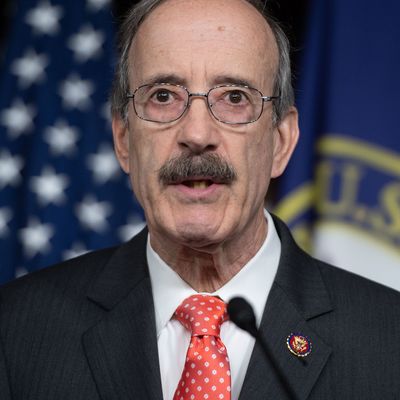
It’s understandable that 16-term New York congressman Eliot Engel is sore about losing the seat he’s held since 1989 to first-time candidate Jamaal Bowman in a Democratic primary, and perhaps offended that some of his colleagues in Washington endorsed his opponent. But his argument against any breach of caucus solidarity is ridiculous once you break it down. CNN has the story:
House Foreign Affairs Chairman Eliot Engel, a 16-term veteran who was vanquished in his New York primary by a progressive insurgent, bluntly warned his fellow Democrats against backing challengers against sitting lawmakers from the same party.
“I think that it’s a very dangerous thing for party unity if members are going to start putting up primary challenges to other members in the same caucus,” Engel, 73, who has served in the House for nearly 32 years, told CNN on Monday. “I think it’s not something that should be done.”
The idea that House members “put up” Bowman to challenge Engel is a little insulting. He was a well-known middle-school principal and activist in the Bronx who announced his candidacy over a year ago. He didn’t receive his endorsements from House members (Alexandria Ocasio-Cortez and Ayanna Pressley) until June of 2020, well after he had shown himself to be a viable contender. Yes, he was supported by the progressive group Justice Democrats, but the group hardly had the clout and fundraising capacity of some of the groups in Engel’s corner, notably AIPAC. For that matter, Engel had a lot more backing from House members and their organizational arms than Bowman received from anyone in Washington, as the American Prospect reported:
Among Engel’s endorsers in the past few weeks are the most powerful players in the Democratic party: House Speaker Nancy Pelosi, Intelligence Committee chair Adam Schiff, third-ranking House Democrat [Jim] Clyburn, caucus chair Hakeem Jeffries, New York senator Kirsten Gillibrand (the state’s senior senator, Chuck Schumer, was listed on Engel’s website as an endorser, but recently claimed to be sitting the race out). Hillary Clinton came off the sidelines to make Engel her first House race endorsement this cycle, joining the CBC [Congressional Black Caucus] and End Citizens United, a PAC largely seen as an outgrowth of the Democratic Congressional Campaign Committee.
Since the 16th congressional district of New York is very safely Democratic (it has a Partisan Voting Index of D+24, which means it is 24 points more Democratic than the country as a whole), Engel is basically arguing that his colleagues should help him maintain a life tenure on a U.S. House seat. If primaries are ever to be acceptable, shouldn’t it be in this sort of district, as opposed to a marginal district where intraparty divisions might let the Republican wolf at the door come in? And why should an incumbent automatically enjoy the combined clout of her or his colleagues and all the powerful and well-heeled interest and advocacy groups they attract?
Here’s the rationale Engel gave CNN:
“Who is going to (be able to serve) in a caucus if there are people sitting right in there who want to get you defeated?” Engel said in the Capitol. “I would be reluctant and other people would be reluctant to say what they feel. I just think it’s not something I would do.”
I don’t know what exactly Engel might have wanted to share with colleagues that he didn’t want divulged to his constituents, but perhaps he was thinking of this deadly incident from his own campaign, as reported by Politico:
Rep. Eliot Engel became engulfed in yet another controversy on Tuesday after he was overheard on a “hot mic” saying he only sought press attention at a local event on the unrest over police brutality because of his upcoming primary threat.
“If I didn’t have a primary, I wouldn’t care,” the New York Democrat told Ruben Diaz Jr., the Bronx borough president, as he asked for time to speak at a news conference on local vandalism.
The gaffe sure made Engel sound like an entitled incumbent who needed a good primary challenge every decade or so (his last was actually in 2000) in order to be reminded that the U.S. House of Representatives is not some group of landed aristocrats bound to protect each other against the commoners pounding on their gates.






























